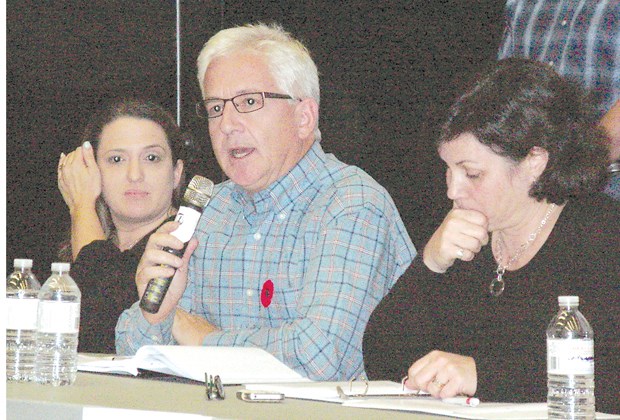The price paid by international students and educational costs absorbed by parents were just two of the issues touched on in a North Vancouver school trustees debate at Sutherland secondary Nov. 6.
On Nov. 15, voters will choose four candidates from the District of North Vancouver and three from the City of North Vancouver.
District candidates
Incumbent Barry Forward defended the school board's sale of properties at Braemar, Monteray, Argyle and Keith Lynn.
The sales, which followed thorough public debate, were necessary to help fund future projects, according to Forward.
"Let's get the provincial government to build a new Argyle," he said. "We've done our dirty work, now they have to do theirs."
Heather Skuse weighed in on the fate of the district's shuttered schools.
"The glib answer would be reopen them, but that's not going to happen in the near future," she said.
The schools should remain as public assembly lands, providing recreational space, daycare, or a spot for religious services, Skuse suggested.
Shane Nelson supported keeping the lands for public assembly but pointed out the school board isn't in the business of property management.
Working out an arrangement where the district takes custody of the land could be an option, according to Nelson.
The path to increased provincial funding begins with enhanced communication, according to Jessica Stanley.
"We don't have sufficient supports for children with special needs, we don't have up-to-date learning materials. The community needs to know what's happening in our schools," she said.
A well-informed community is more likely to petition MLAs, Stanley added.
"In our deeply inequitable society, public education is the greatest equalizer that we have," she said.
Trustees need to put the province in the crosshairs, according to Dave Jackson.
"We need to put pressure on them, if that's the only way to go, we need to embarrass them whenever possible," he said.
Jackson is using that approach in the hopes of getting a closer accounting of the tuition paid by international students.
"School compensation for international students is inadequate," Jackson said, suggesting tuition rates be doubled.
North Vancouver schools falling behind is a huge concern, according to Shane Nelson.
"We're missing opportunities because we haven't listened to what our families and our children and our teachers want in the school district," he said.
Kelly Muirhead disagreed, pointing to the district's burgeoning enrolment, which is aided by sports academies and International Baccalaureate schools.
She also pointed out that many students from neighbouring districts attend North Vancouver schools.
"I do believe that 20 per cent of West Vancouver students attend school in North Van, so it's not just an exodus from here to there," she said.
School board chairwoman Franci Stratton agreed.
"I think we're offering quality and diversity," she said, mentioning the district's high percentage of French immersion students.
Several trustees discussed their motivation for standing for office.
"It all began with my frustration over the campaign for the covered play area at Highlands elementary being denied," said Edward Desaulniers. "I'm confident I can help solve the problem."
Following the recent labour strife, the school board's most important job is fostering a healthy work environment, according to Yael Drinkle.
"The last few years have been tough on everyone, teachers included, and we need to rebuild a collaborative environment," she said, encouraging more open dialogue.
The trustee's role is to support personalized education that will help students prepare for the next stage of life, according to Susan Lockhart.
"No student, regardless of special needs, financial situation or any other situation, should be prevented from experiencing the same quality of education as other students."
Incumbent Cyndi Gerlach positioned herself as a voice for students with special needs.
Gerlach said she has two children diagnosed with autism and one coping with a learning disability.
"I don't have a degree in any of this but what I have is street smarts," she said.
City candidates
The school board needs to hire principals and vice-principals with an aim of cultivating a flourishing work environment, according to city candidate Megan Higgins.
"Right now (teachers) are overstretched, they feel unsupported and not respected," she said.
Incumbent Susan Skinner touted a curriculum including social and emotional learning, which leads to increased empathy.
"Compassion is necessary if we are to combat the serious problem of bullying. And not just with our students but with adults, all the adults who work in the system," she said.
Former trustee Mary Tasi touted past accomplishments, such as facilitating an unprecedented meeting with administrators and Squamish Nation officials to address the graduation rate for Aboriginal students, which was hovering at 30 per cent.
Within three years that number jumped to 60 per cent. Several candidates discussed dealing with the province to increase funding, but Tanya Lahulek was unique in suggesting an overhaul of the budget structure.
Budgets should be drawn from the ground up "instead of budgeting for the top and having it trickle down into the classrooms," she said.
The funding problem seems acute, according to Bill Papandreou, who discussed his motivation to run.
"Why are these children always fundraising? There's something missing, something lacking," he said.
As a trustee, Papandreou said he would advocate for enhanced programs.
"I'm a big believer in the outdoor education programs," he said.
Handling technology in the classroom carries a burden, according to incumbent Christie Sacre.
"It is crucial that we teach online safety and how to use technology efficiently, but there are also many teachers and parents who feel that students get enough of technology already," she said.
Technology has changed education, according to Antje Wilson. "Education isn't about telling kids things anymore. We need education to teach students how to find information, and how to validate that information because when you go to Google it's not always the real, truthful answer," she said.



